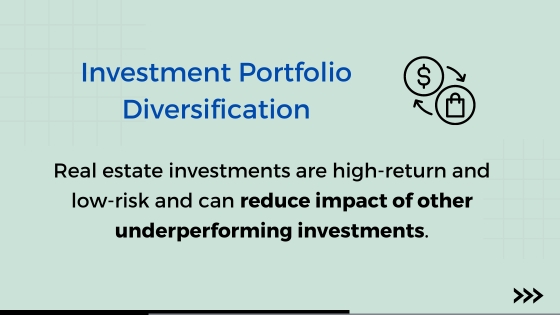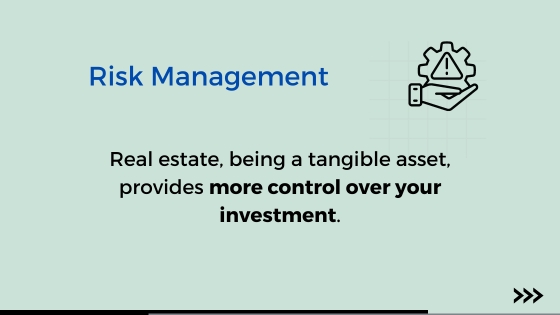Why Real Estate? Explore the Top 7 Benefits of Real Estate Investment

When we talk about real estate investing, we're discussing the purchase, ownership, management, rental, and/or sale of real estate for profit. There are many benefits of investing in real estate sector in which real estate agents and owners can generate income and build wealth from rental properties, real estate investment trusts (REITs) and crowdfunding platforms.
In this blog, we're going to delve deep into the advantages of real estate investing, exploring various benefits that make it an attractive investment. We will also share some essential tips to get started in real estate investing, from understanding market dynamics of the investment properties, to evaluating potential investment properties and more.
Why Invest in Real Estate?
Real estate is a crucial component of a well-rounded investment portfolio. It can provide steady cash flow, appreciate in value, offer numerous tax benefits, and act as a hedge against inflation.
The current economic climate has made real estate investing more important than ever before, as it highlights the significance of having rental properties create different income streams to generate cash flow and financial security.
Also Read: Top Indian Cities for Affordable Investing and High Returns
Top 7 Benefits of Real Estate Investment
#1 Return on Investment (ROI)
The potential returns from real estate investments can be significant. These returns come in two main forms: rental income (short-term) and property appreciation (long-term).

Rental income provides regular, ongoing returns, while appreciation delivers a larger payoff when you sell. These returns can often be higher than other forms of investment, such as bonds or savings accounts, making real estate an attractive investment option.
A. Cash Flow & Rental Income Potential
One of the primary benefits of real estate investing is the potential for steady cash flow through rental income. This income can serve as a consistent source of passive income, supplementing your regular income or even becoming your primary source of income.
Rental income from commercial properties is generally stable and predictable, secured by leases which often last one year or more. This can provide financial stability and help cover the costs associated with owning and maintaining the commercial property itself.
B. Property Value Appreciation
Real estate, in general, tends to appreciate over time. This means that the value of the real estate investment property you invest in today could be significantly higher in the future.
This potential increase in value can provide a substantial return on investment when you decide to sell. Appreciation is a powerful wealth-building tool, and it's one of the main ways real estate investors grow their net worth over the long term.
Also Read: How Location can Affect Real Estate Prices
#2 Tax Benefits

Real estate investors can also benefit from numerous tax advantages. For instance, the income generated from rental properties is subject to different tax treatments than ordinary income. Investors can deduct expenses related to owning, operating, and managing a property.
Furthermore, the IRS (Indian Revenue Service) allows tax deductions in case of depreciation to be deducted over the life-cycle of a property—another way to lower taxable income.
#3 Investment Portfolio Diversification

Investing in real estate allows for diversification of other investment strategies in your investment portfolio.
Real estate is a different asset class with unique risk/reward characteristics, making it an excellent way to diversify a portfolio dominated by stocks and bonds.
Diversification spreads risk across different types of investments, thereby reducing the impact if one investment underperforms other investments.
#4 Risk Management

Compared to other investment alternatives, investing in real estate can be a safer investment option sometimes. Real estate is a tangible asset that you can use, improve, or rent out, which offers some degree of control over your investment.
It is often less susceptible to drastic fluctuations than stocks, bonds, or cryptocurrencies. While no investment is risk-free, the risks associated with real estate investing can often be mitigated through proper research, planning, and management.
#5 Protection Against Inflation

Real estate investments and income property can act as a hedge against inflation. When inflation occurs, the price of goods and services increases. With this, rental rates and property values also typically increase.
This means that as the cost of living rises, so does the income you earn from your own home loan and property investments, helping you maintain your purchasing power.
#6 Leverage Capital

Real estate allows for leveraging capital, which means you can borrow money to buy more property than you could afford outright. By doing this, you can build equity that can amplify your potential profits in stock market. However, it's essential to use leverage wisely because it can also amplify potential losses if property values decline.
#7 Wealth Building

Over time, real estate investments can contribute significantly to building wealth. The combination of steady, positive cash flow,, appreciation, and the power of leverage can lead to substantial growth in your net worth. In addition to capital gains, real estate can be a source of generational wealth, providing financial stability for future generations.
Also read: Mastering Real Estate Terms
How to Get the Best Advantages of Investing in Real Estate

Do Market Research
Understanding the real estate market is crucial for any investor. This includes knowing the current trends in housing prices, understanding the supply and demand dynamics in different areas, and being aware of broader economic factors that can influence the market and top features/aspects to look for a new home.
Proper market research can help you identify the best times to buy or sell, the most promising locations, and the types of properties that are in demand. A deep understanding of the market can enhance the benefits of your real estate investment by maximizing returns and mitigating risk.
Consider Location Factors
The location of a property can significantly influences its value and rental income potential. Factors such as proximity to amenities, neighborhood status, school districts, tax breaks, and future development plans for residential properties can impact a property's appeal to both renters and buyers. Investing in residential property in a desirable location can lead to higher rental income and property appreciation, boosting the overall return on your investment.
Property Evaluation
Evaluating the property correctly is another key aspect of successful real estate investing. This involves assessing the physical condition of the property, estimating any necessary repairs or renovations, and understanding the property's potential for appreciation or rental income. A thorough property evaluation can prevent unforeseen expenses and help ensure a good return on investment options any real estate investment strategies used.
Also Read: Pros and Cons of Buying Home
Budgeting and Financing
Careful financial planning is crucial in real estate investing. This includes setting a realistic budget, securing financing with favorable terms, and factoring in all potential costs, including maintenance, property taxes, insurance, and vacancy periods.
Effective budgeting and financing can improve the profitability of your investment and help you navigate unexpected expenses without jeopardizing your returns.
Legal Aspects
Understanding the legal aspects of real estate investing is essential. This includes knowing your property rights, understanding local real estate laws, pay taxes, zoning regulations, and being aware of your obligations as a landlord if you intend to rent out the property. Knowledge of these legal aspects can protect mortgage interest on your investment and prevent potential legal issues, providing peace of mind and stability for your investment journey.
Investment Goals
Every real estate investor should have clear, realistic goals. Are you looking for a steady stream of rental income? Are you aiming for property appreciation over a longer time frame? Or perhaps a combination of both?
Your investment goals will guide your investment strategy, influencing what kind of real estate properties you invest in, where those real estate properties are located, and how long you plan to hold them. Having clear goals can help you stay focused, make informed decisions, and measure your success, thereby maximizing the benefits of your real estate investments.
Common Mistakes that can Nullify the Benefits of Real Estate Investment

- Underestimating Costs: A common mistake many investors make is underestimating the costs associated with owning and managing a property. These can include operational costs, repairs, maintenance, property taxes, insurance, and potential renovation expenses. It's crucial to thoroughly account for these expenses when calculating potential returns. Ignoring or underestimating these costs can significantly impact the profitability of your investment.
- Ignoring Property Inspection: Some investors might overlook property inspections to save time or money, but this can be a costly mistake. A professional property inspection can reveal potential issues with the property that might need expensive repairs, such as structural problems, roofing issues, plumbing or electrical faults. Identifying these issues before purchasing can either prevent a bad investment or provide room for price negotiation.
- Neglecting Market Trends: Ignoring current real estate market trends is another pitfall. Market trends, such as fluctuations in property prices, shifts in rental demand, or changes in the local economy, can significantly impact the value and profitability of your investment. Investors who neglect these trends risk making ill-informed decisions, which can lead to lower returns or even losses.
- Overlooking Property Management: Effective property management is crucial to maintaining the value of your investment and ensuring consistent rental income. Good property management includes regular maintenance, prompt repairs, efficient tenant screening and relationship management, and more. Investors who overlook this aspect can end up with deteriorating property conditions, tenant disputes, or prolonged vacancy periods—all of which can eat into your returns.
- Overlooking Vacancy Periods: Some investors fail to consider possible vacancy periods in their cash flow calculations. However, there will likely be times when a rental property might not be occupied. During these periods, you would still need to cover the property's costs without rental income to offset them. Not factoring in potential vacancies can lead to unrealistic income projections and financial strain.
- Over-reliance on Appreciation: While property appreciation can significantly contribute to real estate returns, relying too heavily on this can be risky. Property values can fluctuate due to various factors, including changes in the economy, local market conditions, and property-specific issues. Investors who rely too heavily on appreciation for returns may find themselves with a less profitable investment if the property value doesn't increase as expected or even declines.
Keep these mistakes in mind and make sure to avoid any oversights that investors often make in real estate to ensure you get the right return on your investments.
In this blog, we've journeyed through the compelling world of investing in real estate, exploring its numerous benefits and understanding why it stands as a powerful tool for wealth creation.
Although real estate investing can provide a steady income stream, substantial return on investments via appreciation, tax benefits, protection against inflation, and long-term wealth building, it's essential to learn the Basics of Real Estate Investing, to make sure you avoid getting into financial (or legal) troubles in the future. Especially, if you're a first time investor.
So, make sure to research the real estate market thoroughly, choose the right location, carry out a full property evaluation, carefully plan your budget and financing strategy, and understand the legal aspects before getting into the world of real estate investments. With a clear goal of your investment outcome, you can be sure to enjoy all the benefits of real investing in the near future. Happy Investing!











